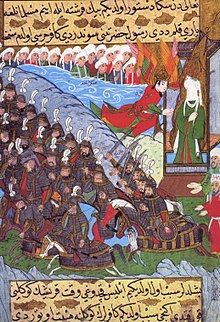Jihad
The term jihad [dʒiˈhaːd] (Arabic جهاد Dschihād, DMG ǧihād 'exertion, struggle, effort, commitment'; also jihad, cihad/cihat, or occasionally in the English spelling jihad) refers in a religious sense to an important concept in the Islamic religion, 'the effort/struggle in the way of God' (al-dschihādu fī sabīli Llāh / الجهاد في سبيل الله / al-ǧihādu fī sabīli Llāh). Its origin is the doctrine of jihad in the Qur'an and the Sunnah of Muhammad. (See #Jihad in the Qur'an).
Etymologically, the term refers to an effort directed towards a specific goal. In the Qur'an and the Sunnah, this term primarily refers to military combat. It is not clear from the Qur'an whether this is a universal struggle against those of other faiths or whether this struggle only pursues defensive goals: "The existing scriptural material requires interpretation, whereby the attitude of the interpreters is of decisive importance, which was and is decisively shaped by the different political and social conditions. “
According to classical Islamic jurisprudence (fiqh), whose development can be dated to the first centuries after the death of Muhammad, this struggle serves to expand and defend Islamic territory until Islam becomes the dominant religion. In its later development, as well as particularly in the course of modernity, Muslim scholars have begun to emphasize non-military aspects of this struggle (See paragraph below: Non-Military Interpretations of the Concept of Jihad). Muslim authors of the modern era view as legitimate only those wars that serve to defend Islamic states, the freedom of Muslims to preach Islam outside them, and the protection of Muslims under non-Islamic rule. Their interpretation of corresponding Qur'anic verses corresponds to this.
As one of the basic commandments of the Islamic faith and a duty imposed on all Muslims, jihad is an important principle of faith in Islam. Some Sunni scholars count jihad as the sixth of the "five pillars of Islam".
The Kharijites included jihad among the five pillars of Islam.
Until the appearance of the so-called Hidden Imam, Muhammad ibn Hasan, the Twelver Shia does not know any jihad for the expansion of the Islamic domain, since only the latter is entitled to lead it. Nevertheless, the defense of one's own territory is still obligatory for the Twelver Shiites, which, however, is not understood as jihad. In
view of military necessity, the corresponding legal doctrine has understood how to find ways around this regulation, so that even wars in the absence of the hidden Imam could receive legal legitimacy.
In the European language area the term is more often translated with the expression Holy War. Muslim authors counter that jihad semantically does not only denote warfare, that there are non-military meanings of the term jihad, and that they therefore regard such a translation as wrong and reject it.
In Islamic studies, jihad is commonly described as holy war in the sense of a war prescribed by God, waged for His sake and rewarded by Him. However, the equation of the two terms as such often meets with rejection in research.
Jihad is also an Arabic given name, which is also legally permitted in other spellings in the German-speaking world.

Illustration of the Battle of Badr (624) in the Siyer-i Nebi. According to Islamic scripture, the hosts of angels depicted in it, together with Gabriel (Jibrīl), rushed to the aid of the Muslim army.
Non-military interpretations of the concept of jihad
While both the Qur'an and the Sunna, as well as the majority of classical scholars, understood jihad primarily or exclusively as a military activity, non-military interpretations of the doctrine of jihad also emerged in the course of its development. This happened especially in the course of profound political changes such as the colonization of large parts of the Islamic world, the abolition of the caliphate, and the developments of modernity.
Individual Shi'ite theologians of the classical period distinguished between the so-called greater jihad in the sense of a spiritual struggle against inner desires and the lesser jihad in the sense of a military confrontation against an external enemy. This corresponds to the emphasis on non-military aspects of the duty of jihad of many contemporary Muslim authors, as well as Muslim ascetics and mystics.
Postclassical jurists have divided the term into four types:
- The jihad of the heart (dschihad bi l-qalb) as an inner, spiritual struggle against vice, seduction to morally reprehensible deeds and ignorance.
- The verbal jihad (jihad bi l-lisan) by constantly speaking the truth and spreading Islam peacefully. This also includes the public speaking of the truth (haqq) under an unjust ruler.
- Jihad by deeds, i.e. by right moral conduct (jihad bi l-yad): enjoining what is right and forbidding what is reprehensible.
- The jihad of the sword, as a military struggle in the way of God.
With this understanding, jihad is directed against one's own ego, against the "drive soul" (an-nafs al-ammāra bi 'l-sūʾ). Enforcing the injunction to enjoin the right and forbid the reprehensible is done "with the tongue, with the hand, and with the sword, according to what one is capable of." The ascetics see fighting against oneself (mujahadat an-nafs) as the highest ideal.
A well-known example of such interpretations from the modern era was President Habib Bourguiba's proclamation that the struggle against Tunisia's economic decadence was to be considered jihad. Since a mujahid, one engaged in jihad, was exempt from the obligation to fast in Ramadan, Bourguiba argued that fasting in Ramadan was therefore not an obligation even for working people - who were thus also to be considered fighters of the faith. In this way, he sought to eliminate the annual economic stagnation during this month. His view in this regard was subsequently also adopted by parts of Islamic scholarship.
See also
- Just war
- Holy War
- ʿAbdallāh ibn al-Hurr al-Qaisī
- Cihat (Turkish first name with almost identical pronunciation)
- El Jihad (propaganda newspaper during the First World War)
Search within the encyclopedia